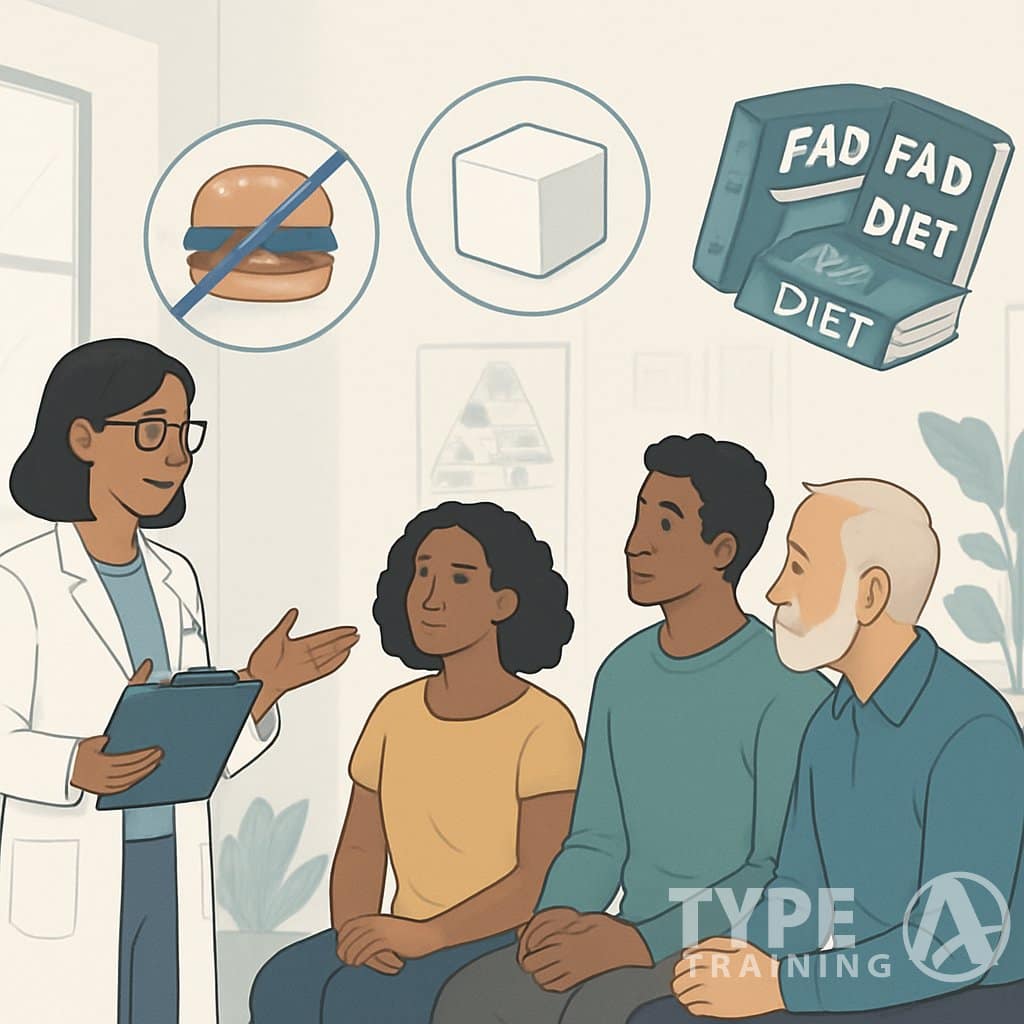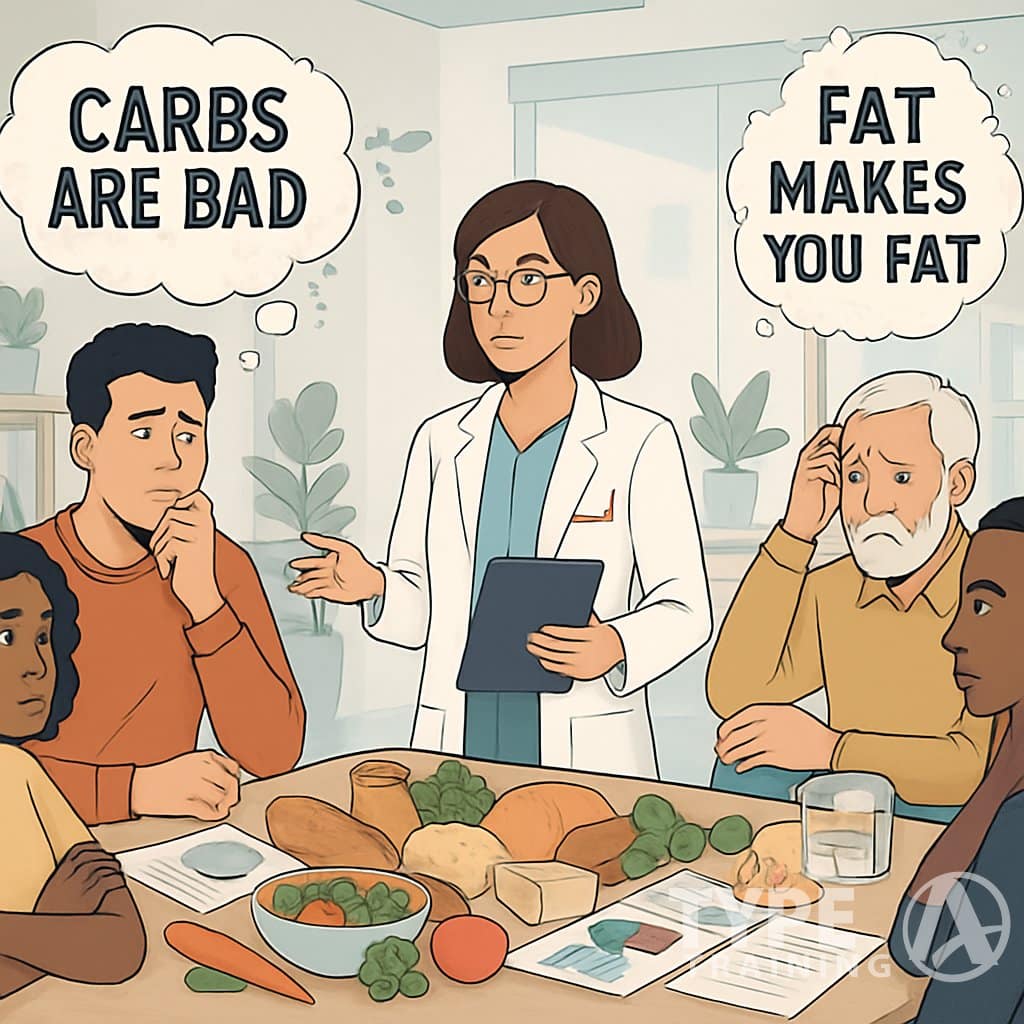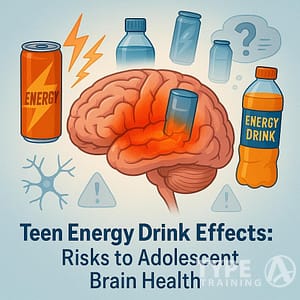You’ve probably heard countless nutrition “facts” that turned out to be completely wrong. From the idea that all fats are bad to believing you must eat breakfast every day, nutrition myths spread faster than scientific truth.
These widespread misconceptions about nutrition services and dietary advice can prevent you from making informed decisions about your health. They might even lead you away from eating patterns that actually work for your body.

Social media influencers, misleading food labels, and outdated advice from well-meaning sources create a flood of nutrition misinformation. Even some health professionals accidentally spread myths that research has already debunked.
Popular posts:
This confusion makes it hard to know what nutrition advice you can trust. The truth is that many popular nutrition beliefs have little scientific support.
Key Takeaways
- Most popular nutrition myths lack scientific evidence and can harm your ability to make healthy food choices
- Misinformation spreads through social media, marketing claims, and outdated advice from various sources
- Learning to identify false nutrition claims helps you focus on evidence-based eating strategies that actually work
Why Nutrition Myths Persist

Nutrition myths spread quickly because people trust simple answers from familiar sources. Most of us want easy solutions to health problems.
These false beliefs get stronger through social media and confusion about who can give nutrition advice.
Sources of Misinformation in Nutrition
Family and friends often share nutrition advice based on personal stories rather than science. When someone loses weight on a specific diet, they tell others it will work the same way for everyone.
Celebrities and influencers promote diet trends without medical training. They share what worked for them but ignore that each person’s body is different.
Outdated health professionals sometimes spread old information. Even doctors and nurses may not know the latest nutrition research if they haven’t updated their knowledge recently.
Quick-fix promises appeal to people who want fast results. Myths like “eat grapefruit to burn fat” or “avoid all carbs” sound simple compared to balanced eating advice.
People also trust sources that confirm what they already believe. If someone thinks fat makes you gain weight, they’ll believe articles that support this idea even when science shows otherwise.
The Role of Social Media and Influencers
Social media makes nutrition myths spread faster than ever before. A single post about a “miracle food” can reach millions of people in hours.
Influencers without training share nutrition advice to their followers. They may have great bodies or seem healthy, but this doesn’t mean they understand nutrition science.
Clickbait headlines grab attention with dramatic claims. Posts saying “This one food melts belly fat” get more clicks than honest advice about balanced eating.
Echo chambers form when people follow accounts that share similar beliefs. This makes false nutrition advice seem more true because everyone in their feed agrees.
Before-and-after photos can be misleading. People may lose weight from eating less calories overall, not because they avoided certain foods or took specific supplements.
Misuse of the Term ‘Nutritionist’
The word “nutritionist” confuses many people because it’s not always protected by law. This lets unqualified people call themselves nutrition experts.
Anyone can use the title in most places without special training. Someone who took an online course or read nutrition books might call themselves a nutritionist.
Real nutrition experts usually have titles like “Registered Dietitian” or “Registered Dietitian Nutritionist.” These require college degrees and passing tough exams.
People often don’t know the difference between trained professionals and self-proclaimed experts. This makes it easy for unqualified people to spread wrong nutrition advice.
Product sales motivate some fake nutritionists. They may promote expensive supplements or special diets to make money rather than help people eat better.
Debunking Myths About Diet and Foods

Many false beliefs about specific foods and eating patterns persist despite scientific evidence. These myths often lead people to avoid nutritious foods or make poor dietary choices based on outdated information.
Carbohydrates Are Bad for You
Carbs are not the enemy. Your body needs carbohydrates as its primary energy source. The problem lies in choosing the right types of carbs.
Simple vs. Complex Carbs:
- Simple carbs: White bread, candy, sugary drinks—these cause blood sugar spikes.
- Complex carbs: Whole grains, legumes, vegetables—they provide steady energy.
Whole foods containing carbs offer essential nutrients. Fruits and vegetables provide vitamins, minerals, and fiber.
Lentils and other legumes deliver protein along with their carbs. Nutrient-dense carb sources include:
- Brown rice and quinoa
- Sweet potatoes
- Fresh fruits and vegetables
- Beans and lentils
Your brain runs primarily on glucose from carbs. Cutting out all carbs can leave you feeling tired and unfocused.
All Fats Should Be Avoided
The low-fat diet trend created fear around all fats. This myth ignores the fact that your body needs healthy fats to function properly.
Essential fat functions:
- Hormone production
- Vitamin absorption (A, D, E, K)
- Cell membrane health
- Brain function
Research shows that low-fat diets may increase heart disease risk factors. They often lead to higher triglyceride levels and insulin resistance.
Healthy fat sources:
- Avocados and olive oil
- Nuts and seeds
- Fatty fish like salmon
- Whole eggs
Avoid trans fats found in some processed foods. Focus on getting fats from whole foods rather than eliminating this important nutrient group entirely.
Processed Foods Are Always Unhealthy
Not all processed foods are created equal. The level of processing matters more than the fact that a food is processed at all.
Minimal processing can be helpful:
- Frozen fruits and vegetables retain nutrients
- Canned beans offer convenience without additives
- Plain yogurt undergoes beneficial fermentation
Avoid heavily processed options:
- Foods with long ingredient lists
- Items high in added sugars and sodium
- Products with artificial preservatives
Read ingredient labels carefully. Choose processed foods that contain recognizable ingredients.
Many nutrient-dense foods undergo some processing to make them safe and convenient.
Skipping Breakfast Causes Weight Gain
The idea that breakfast is the most important meal lacks strong scientific support for most adults. Skipping breakfast does not automatically lead to weight gain.
Research findings:
- Skipping breakfast may reduce total daily calories
- Intermittent fasting can offer health benefits
- Meal timing matters less than overall diet quality
Some people feel more energetic eating breakfast. Others prefer to eat their first meal later in the day.
Both approaches can support a healthy diet. Focus on these factors instead:
- Eating nutrient-dense foods when you do eat
- Getting adequate protein throughout the day
- Choosing whole foods over processed options
Your hunger patterns and lifestyle should guide your meal timing decisions.
Exposing Misconceptions About Weight Loss and Management
Many people believe wrong things about losing weight and keeping it off. The truth is that calorie counting isn’t the only way to lose weight.
When you eat matters less than what you eat, and you don’t need to give up all your favorite foods forever.
Calorie Counting Is the Only Path to Weight Loss
Calorie counting is just one tool for weight loss, not the only method. Many people lose weight successfully without tracking every calorie they eat.
Your body processes different foods in different ways. A 200-calorie apple affects your body differently than 200 calories of candy.
The apple has fiber and nutrients that help you feel full longer. Quality matters more than just quantity.
Foods high in protein and fiber help control hunger better than processed foods with the same calories. Some people do better with other methods:
- Focusing on whole foods
- Eating smaller portions
- Following structured meal plans
- Using intermittent fasting
Research shows that people who focus on food quality often lose weight without counting calories. They naturally eat fewer calories because healthier foods are more filling.
The best weight loss approach is one you can stick with long-term. If counting calories feels too hard or stressful, other methods can work just as well for weight management.
Meal Timing and Weight Gain
When you eat has much less impact on weight gain than what and how much you eat. Your body doesn’t automatically store food as fat after a certain time.
The myth about not eating after 6 PM or 8 PM isn’t based on science. Weight gain happens when you eat more calories than you burn over time.
This is true whether you eat those calories at noon or midnight. Late-night eating can lead to weight gain for other reasons:
- People often choose high-calorie snacks at night
- Late eating may disrupt sleep patterns
- Nighttime eating is often emotional eating
Some research suggests that people who skip breakfast may have larger waist sizes and higher cholesterol levels. But this doesn’t mean breakfast directly prevents weight gain.
Your total calorie intake over days and weeks matters most. Some people lose weight eating one meal a day. Others do better with six small meals.
The key is finding an eating schedule that helps you control your overall calorie intake. Choose timing that fits your lifestyle and helps you make better food choices.
Giving Up Favorite Foods for Weight Management
You don’t need to eliminate all your favorite foods to lose weight successfully. Complete restriction often leads to giving up on weight loss plans entirely.
Cutting out foods you love can make you crave them more. This often leads to overeating those foods later.
Many people abandon their weight loss efforts because they feel deprived. The British Heart Foundation states that depriving yourself of enjoyed foods won’t work long-term.
You’ll eventually give in to temptation and stop your efforts. A better approach includes:
- Eating favorite foods in smaller portions
- Having treats occasionally, not daily
- Finding healthier versions of loved foods
- Planning treats into your weekly meals
Moderation works better than elimination. You can include small amounts of higher-calorie foods while still losing weight.
Focus on making most of your food choices healthy ones. Save room for small portions of foods you really enjoy.
This approach helps with both weight loss and long-term weight management. The goal is creating eating habits you can maintain for life, not following strict rules that feel like punishment.
Clearing Up Misunderstandings on Sugar, Salt, and Additives
Many people believe all sugar damages health and artificial sweeteners cause cancer. The truth is more complex—natural sugars in fruits provide nutrients, while moderate amounts of added sugars fit into healthy diets for most people.
All Sugars Are Unhealthy
Not all sugars affect your body the same way. Natural sugars found in fruits and dairy come with fiber, vitamins, and minerals that benefit your health.
Added sugars like white sugar, brown sugar, and honey don’t automatically harm you. If you’re healthy without diabetes or weight issues, moderate amounts are fine.
The daily limits for added sugar are:
- Women: 24 grams per day
- Men: 36 grams per day
One packet of sugar contains about 4 grams. A 12-ounce soda has 39 grams—more than the daily limit in one drink.
Too much added sugar causes inflammation and weight gain. Your body handles small amounts well if you stay within limits.
Processed foods often hide added sugars. Check labels to track your daily intake and make informed choices.
Artificial Sweeteners Are Dangerous
Artificial sweeteners can help you cut sugar without big health risks. They’re handy if you’ve already passed your daily sugar limit.
If you drink several sodas a day, swapping some for diet versions can really trim your calories. The same goes for coffee loaded with sugar packets.
These sweeteners let you enjoy sweet flavors while managing your weight and blood sugar. Food safety agencies approve them after a lot of testing.
You can mix regular and artificial sweeteners depending on your daily needs. This gives you some wiggle room while looking out for your health.
Salt Is Always Harmful
Your body actually needs a bit of salt to work right. The trouble starts when you eat too much, especially from processed foods.
Most Americans eat about twice as much salt as recommended. Processed foods make up about 70% of that—not your salt shaker.
Checking food labels helps you spot lower-salt choices. Fresh foods usually have less salt than packaged ones.
If you cut back on salt gradually, your taste buds can adjust. Over time, you’ll probably start liking less salty flavors.
People with high
Challenging Myths About Specific Foods, Nutrients, and Health
Some foods that got a bad rap are actually good for you. Meanwhile, a lot of trendy health advice doesn’t really hold up.
Knowing the real story about eggs, nuts, supplements, and cholesterol can help you make better choices.
Eggs and Heart Disease Risk
For years, people skipped eggs because of cholesterol fears. That myth led a lot of folks to miss out on a nutritious food.
Eggs are safe for most people. Research shows they don’t raise your risk of heart disease. The cholesterol in eggs barely affects your blood cholesterol.
Your liver makes most of your body’s cholesterol. When you eat more, your liver just makes less.
Eggs pack in nutrients like:
- High-quality protein
- Vitamin D
- Choline for brain health
- Antioxidants for your eyes
Most healthy adults can eat an egg a day without worry. If you have diabetes or heart disease, talk to your doctor about eggs.
Nuts, Seeds, and Healthy Fats
A lot of people still avoid nuts and seeds because they’re high in fat. That thinking is pretty outdated.
Nuts and seeds have healthy unsaturated fats. These fats actually help your heart. Studies say people who eat nuts regularly have lower heart disease rates.
Avocados are in this club too. They offer heart-healthy fats that your body needs.
Benefits of nuts, seeds, and avocados:
- Lower bad cholesterol
- Reduce inflammation
- Provide fiber and protein
- Help you feel full
Olive oil is another healthy fat source. Swap it for butter, and your heart will thank you.
Watch your portions, though. A handful of nuts or a quarter of an avocado is plenty.
Supplements Are Essential for Everyone
The supplement industry wants you to think everyone needs pills for vitamins and minerals. That’s not really true, and sometimes it’s even risky.
Most people get enough nutrients from food. If you eat a balanced diet with fruits, veggies, grains, and protein, you’re probably covered.
Some folks do need supplements. Pregnant women, vegans, and people with certain conditions might need extra help. Your doctor can let you know if you fall into one of those groups.
Problems with unnecessary supplements:
- They can cost a lot
- Some mess with your meds
- High doses might cause side effects
- They can’t replace healthy food
Ask your healthcare provider before starting any supplement. They can check your levels and tell you what, if anything, you actually need.
Dietary Cholesterol and Heart Health
The idea that all dietary cholesterol is bad stuck around for years. But science shows it’s more complicated than that.
Your body needs some cholesterol for hormones and cell membranes. The bigger issue is eating too much saturated fat, not cholesterol itself.
Foods high in saturated fat often contain cholesterol too. That’s probably why cholesterol got blamed. Fatty meats and high-fat dairy are prime examples.
Try these changes:
- Cut back on saturated fat
- Pick lean proteins
- Load up on fruits and veggies
- Use olive oil instead of butter
The 2015 Dietary Guidelines dropped the cholesterol limit. That lines up with what we now know about cholesterol’s real impact.
The Facts About Disease Prevention and Nutrition
Good nutrition directly helps you avoid chronic diseases like type 2 diabetes, heart disease, and some cancers. Your body needs certain nutrients to stay healthy and fight off illness.
Protein and Muscle Building
Protein isn’t just for muscle. It supports your immune system and keeps your metabolism humming.
Most people need about 0.8 grams of protein per kilogram of body weight each day. If you weigh 150 pounds, that’s around 55 grams.
Complete proteins have all nine essential amino acids. You’ll find these in:
- Eggs
- Fish
- Chicken
- Beef
- Dairy
Plant proteins like beans and quinoa can cover your amino acid needs if you mix them up. Your body uses protein to repair tissues and make hormones.
Getting enough protein helps you keep muscle as you age. It also helps with blood sugar control and lowers your risk for type 2 diabetes.
Fiber and Gut Health
Fiber feeds the good bacteria in your gut. These bacteria help you digest food and fight off bad germs.
Adults should aim for 25-35 grams of fiber a day. Most people only get about half that.
There are two main types:
- Soluble fiber dissolves in water and helps lower cholesterol
- Insoluble fiber adds bulk and keeps you regular
Veggies, fruits, whole grains, and beans are top fiber sources. High-fiber foods also help you feel satisfied longer.
Poor gut health ties to lots of diseases. Inflammatory bowel disease, allergies, and even depression are all linked. Eating enough fiber keeps your gut bacteria happy and reduces inflammation.
Plant-Based Diets and Cancer
Plants have compounds that fight cancer cells. Antioxidants, phytochemicals, and fiber all work together to protect you.
Eating more fruits and veggies lowers your risk of several cancers. The strongest evidence is for colorectal, lung, and stomach cancers.
Key cancer-fighting foods:
- Dark leafy greens
- Berries
- Cruciferous veggies like broccoli
- Tomatoes
- Citrus fruits
You don’t have to go full vegetarian. Just adding more plants to your meals helps.
Processed meats like bacon and hot dogs raise cancer risk. Swapping them for beans or nuts can lower that risk.
Role of Vitamins and Minerals
Your body needs vitamins and minerals to prevent disease. They help your immune system work and protect your cells from damage.
Vitamin D helps your body absorb calcium. It also supports immune function.
If your vitamin D levels drop too low, you might face a higher risk of infections. Bone problems can show up, too.
B vitamins help control blood sugar. They may cut down on complications from type 2 diabetes.
They also support nerve function and boost your energy. Honestly, it’s hard to overstate how much your body relies on these.
Magnesium helps with insulin resistance. It also keeps your
A lot of people just don’t get enough magnesium from food. That’s a bit worrying, isn’t it?
Getting nutrients from whole foods usually works better than taking supplements. Foods offer nutrients in forms your body can use more easily.
Some folks still need supplements for specific nutrients. Your doctor can check your levels and suggest what you might need.











